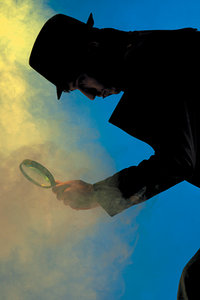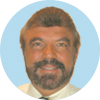Case#1: A 42-year-old male junior executive and serious multi-sport athlete consulted my office complaining of severe, disabling right wrist pain, which he'd been suffering from for over a year.
Golf was completely out of the question, and unfortunately this had an effect on his position in his company. In the past, he would entertain clients at the country club with rounds of golf and a chance to discuss business in a relaxed atmosphere; however, since his injury this had all changed. That meant not only was this patient suffering from the effects of pain and dysfunction, but he also was obviously suffering from the effects of anxiety, fear and uncertainty about the future.
Two previous orthopedic surgeons had been unable to diagnose the cause of the problem, ruling out the usual: carpal tunnel syndrome, sprain, arthritis, or any other plausible explanation. There was no injury to the wrist from any previous event and the patient was looked upon as almost being psychotic, as there appeared to be absolutely no reason for him to have the pain and disability he suffered. Physical therapy had been to no avail; he literally had no response from any procedure, including eight acupuncture treatments by a very qualified practitioner.
 The patient had been referred to me as a last resort for one more attempt at acupuncture at the urging of his orthopedist. The patient was leery, frustrated and unenthusiastic, but still hoped for an answer.
The patient had been referred to me as a last resort for one more attempt at acupuncture at the urging of his orthopedist. The patient was leery, frustrated and unenthusiastic, but still hoped for an answer.
General examination of the right wrist was unremarkable, as were the X-rays from the orthopedist. However, during the examination, I happened to notice a rather large, irregular scar on the outside of his left ankle. On inquiry, I learned the scar was from an earlier skiing accident. He had fractured his ankle, requiring surgical intervention and pinning. He was completely healed from that injury and now it was just a side note in his history.
On further questioning I learned the skiing accident had taken place exactly two months prior to the onset of the right wrist pain, which occurred suddenly and without incident.
One of the most significant cause-and-effect relationships in healing is that what affects the top affects the bottom and what affects the right side affects the left side, and vice versa. It is also understood (or at least accepted) that the right shoulder affects the left hip, the right elbow affects the left knee, and the right wrist affects the left ankle, and vice versa. With this in mind, I simply stimulated his scar tissue on the left ankle with a teishen (non-penetrating needle). The teishen is one of the nine classic acupuncture needles (even though it does not pierce the skin) described in the Nei Ching over 3,000 years ago. In my experience, it is an incredible method of stimulation, as it is quick, effective and covers a large area of involvement in a short time.
On the second visit, I stimulated the scar tissue of the left ankle again, this time with a simple electronic stimulator. At this point the patient admitted he thought me to be incompetent, or at least out of touch, as I had yet to touch his right wrist.
On the third visit, the patient advised me the pain was remarkably improved. Following two more visits of the same treatment to the left ankle, the patient stated that he had played a little tennis with his wife. Three weeks following the initial treatment the patient reported 100 percent improvement in pain and range of motion. I had yet to treat his wrist; the entire treatment was to the opposite ankle.
It has been almost nine months since I first saw him, and the pain has never returned. This patient has directly and indirectly referred to my office at least 50 patients with a variety of conditions. A number of the new patients were clients he met on the golf course.
My file cabinets are filled with similar case histories, as are the files of so many other practitioners who have learned to simply "stimulate the scar tissue wherever you find it." This incident was truly one of the life-changing experiences of my career. I have been a firm advocate of this approach since my early days in practice.
Recently, I received a letter from a prominent chiropractic physician who had attended a lecture in which I elaborated on the effects of stimulating scar tissue for various ailments. His letter reads as follows:
"Remember our conversation in Raleigh, North Carolina about treating scar tissue? I had told you of a patient who had left posterior scapular pain of five years' duration who was resistant to any medical or chiropractic care. Having mentioned the patient had [undergone] breast reduction surgery some years prior, you advised me to find and treat the scar tissue around the breast. I thought to myself, "This is not logical, I told you it was the left posterior shoulder and you send me to the front of the body!
"Being a perpetual student, I decided to give your suggestion a try. The scar tissue was stimulated with one of my assistants in attendance and within two hours the patient reported a complete elimination of pain which has not returned. This was six months ago."
Case #2 involves a patient with chronically elevated liver enzymes. He tried abstinence from alcohol and a fat-free diet for three months, only to have an increase in the level of the enzymes. His history revealed a procedure four years earlier (lymphangiogram) that required an incision on top of each foot (LIV 3 & 4). The scar tissue was treated twice and lab work repeated. All values came back within normal limits.
Case #3 had left lower quadrant pain and was told by her gynecologist that she had adhesions in her scar from a hysterectomy 10 years ago. He told her surgery was her only hope for relief, and that would be doubtful at best. You guessed it: Stimulation of the incision brought about a complete reduction in pain.
Want to turn some lives around? Then look for complete opposites in locating the possible cause of pain, and always remember to stimulate scar tissue wherever you find it. Finger pressure is just OK; teishen is very good. Electronic stimulation is wonderful and He Ne laser or red-light photodynamic therapy achieves results similar to the needle.
Click here for previous articles by John Amaro, LAc, DC, Dipl. Ac.(NCCAOM), Dipl.Med.Ac.(IAMA).





